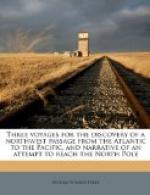At a quarter past nine P.M. we had the satisfaction of crossing the meridian of 110 deg. west from Greenwich, in the latitude of 74 deg. 44’ 20”; by which his majesty’s ships under my orders became entitled to the sum of five thousand pounds, being the reward offered to such of his majesty’s subjects as might succeed in penetrating thus far to the westward within the Arctic Circle. In order to commemorate the success which had hitherto attended our exertions, the bluff headland which we had just passed was subsequently called by the men Bounty cape; by which name I have therefore distinguished it on the chart.
The wind increasing to a fresh gale from the northward in the afternoon, and the ice still continuing to oppose an impenetrable barrier to our farther progress, I determined to beat up to the northern shore of the bay, and, if a tolerable roadstead could be found, to drop our anchors till some change should take place. This was accordingly done at three P.M., in seven fathoms’ water. This roadstead, which I called the bay of the Hecla and griper, affords very secure shelter with the wind from E.N.E. round by north to S.W., and we found it more free from ice than any other part of the southern coast of the island.
The Bay of the Hecla and Griper was the first spot where we had dropped anchor since leaving the coast of Norfolk; a circumstance which was rendered the more striking to us at the moment, as it appeared to mark, in a very decided manner, the completion of one stage of our voyage. The ensigns and pendants were hoisted as soon as we had anchored, and it created in us no ordinary feelings of pleasure to see the British flag waving for the first time in these regions, which had hitherto been considered beyond the limits of the habitable part of the world.




